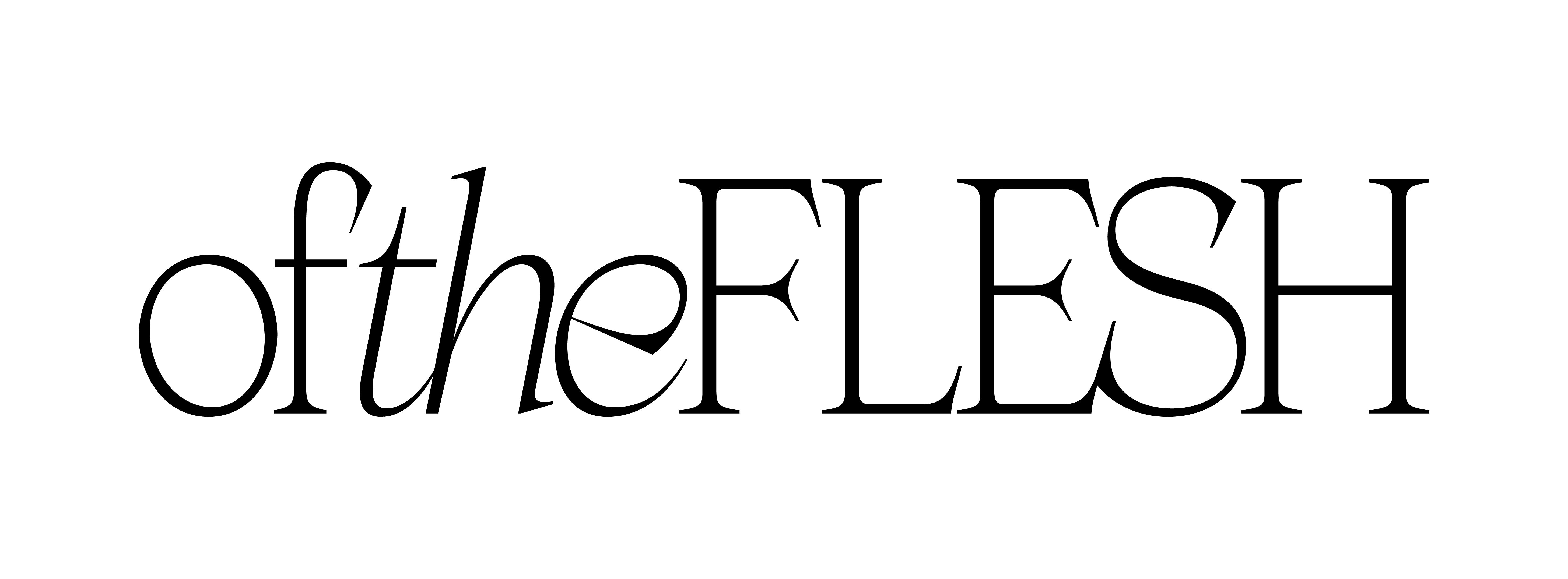A Thank You Letter to My Eating Disorder

Being raised in a Middle Eastern family, it was quickly learned that our culture was brought together by the babies in our uteruses, the food at our tables, and a box of See’s candies from last Christmas. When my family sits around the dinner table, there is an uninterrupted energy that flows through every crevasse in our home like the sweet smell of my father’s lemon blueberry scones. It is a gravitational pull that unifies us in harmony, perfectly aligned and entwined in an envelope of closeness, connection, and carbs. A basket of well-toasted pita, hand-rolled grape leaves carefully stuffed with lamb and fluffy rice, bottomless red wine. In my family, food is not a substance. Food is everything. It is an experience. It is the foundation of cherished traditions and a shared way of living. It is a representation of the love and comfort to be found in our homes where the refusal to break bread is an insult. But in my world, food is a constant fight. It is a coping mechanism. It is the root of my anxiety and obsessive perfectionism. It is a form of control and lack thereof. It has been nearly two years since I washed down an entire package of cookie dough with a bottle of wine and made myself sick—until you returned four days ago.
And I relapsed.
You. You know who you are—this pervasive form of self-harm that lends me a temporary feeling of control when I feel as though I am inadequate, the unyielding itch to eat until I feel completely numb, the urge that sends my head into the cold porcelain until I achieve a sense of relief. You often hide in plain sight, always behind the scenes with your scheming ways. I remember the moments when we used to pretend we were disciplined and devoted to “clean” eating. We made our own beet hummus and snapped vibrant photographs of the magenta filled bowl. We were eager to inspire the world with our new recipe. We ate our greens. We drank our greens. We stood in the isles at Whole Foods and religiously compared nutritional labels in pursuit of perfect health.
At the time, I didn’t realize my brain was becoming progressively occupied with food. I didn’t see the debilitating anxiety I would face when asked to attend a family gathering or go out with friends. I didn’t recognize the warnings—the red flags that would soon plunge me into an eating disorder, a maddening loop of food restriction, cravings, bingeing, and shame. I had no idea that hearing my father tell me I look “healthy” would provoke you and derail my recovery. You crept into my life disguised as a wellness guardian and instead, you became a dangerous obsession.
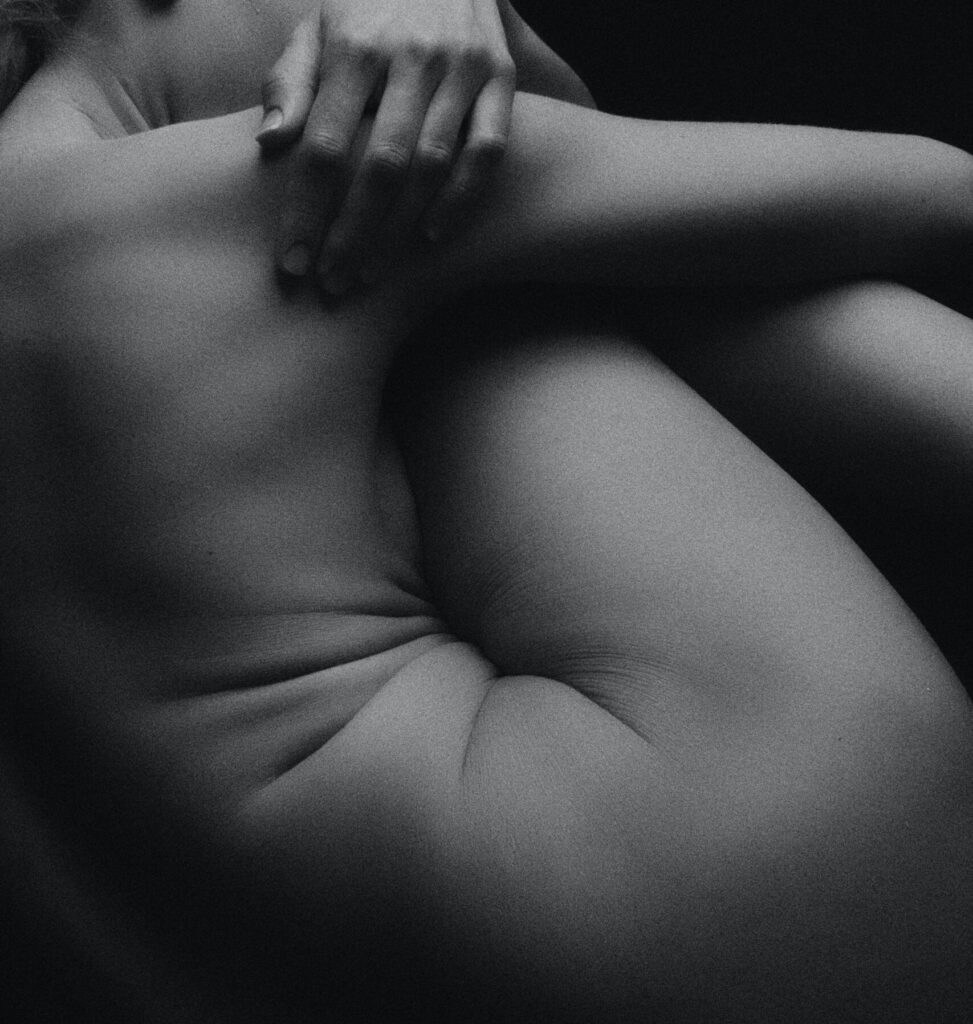
You shape-shifted from orthorexia to bulimia to intense body dysmorphia. You drove me to examine and criticize my appearance—pinching and pulling and picking—to abuse laxatives, to detach from the real world and exercise past the point of burn out. You allowed me to speak so unkindly to myself while I stood in front of the mirror in disgust. You have become a detriment to my mental health. You were the only one who knew it would get this bad and you just sat in the stands and watched my self-worth plummet. Sometimes I am afraid to say your name because it only brings you into existence. But today, I would like to acknowledge you because despite the turmoil you have caused, I want to thank you. Thank you for helping me weather the traumas and challenges that have occurred throughout my life. Thank you for serving as a transient safeguard, a warm fleeting hug, a means of survival when self-harm was the only way I knew how to escape from my griefs and hardships. Thank you for showing up in times of stress, when I was triggered or heartbroken. Thank you for trying to help, but I am going to do something different now because your services are no longer needed. I am taking back my power. I am reclaiming my body as my own.
As I slowly heal from the havoc you’ve left behind, I am uncovering many valuable lessons that I may not have learned without you. But more importantly, through all of the tears I’ve shed, the self-doubt and stomach pains, the acid reflux and fatigue, the red knees and mood swings, you have shown me the person I do not want to be.
I am learning how to be more self-aware and conscious of my emotions, how to redirect the negative thoughts that distract my mind. I am learning that it’s okay not not to be okay sometimes, that I don’t always have to be strong, that taking a moment to look inward rather than using my body as a scapegoat is empowering. I am learning that I am allowed to eat the fucking cupcake without your voice telling me I’m weak for giving in. While I am reinventing the ways in which I strive to show up in life, I am understanding there is no quick fix to healing, that provisional highs are intoxicating, but short lived, and the real growth is found in the grueling work. I am learning how to explore my flawed coping behaviors and the ways in which I can find confidence in my insecurities. I am learning to listen to and honor my body, that self destructive behavior is not beautiful, but rather, I am beautiful.
As I embark further into this journey of recovery, I am not only writing this letter to you, but I am also sharing our narrative in hopes to reflect, process, and release myself from your wearing grip.
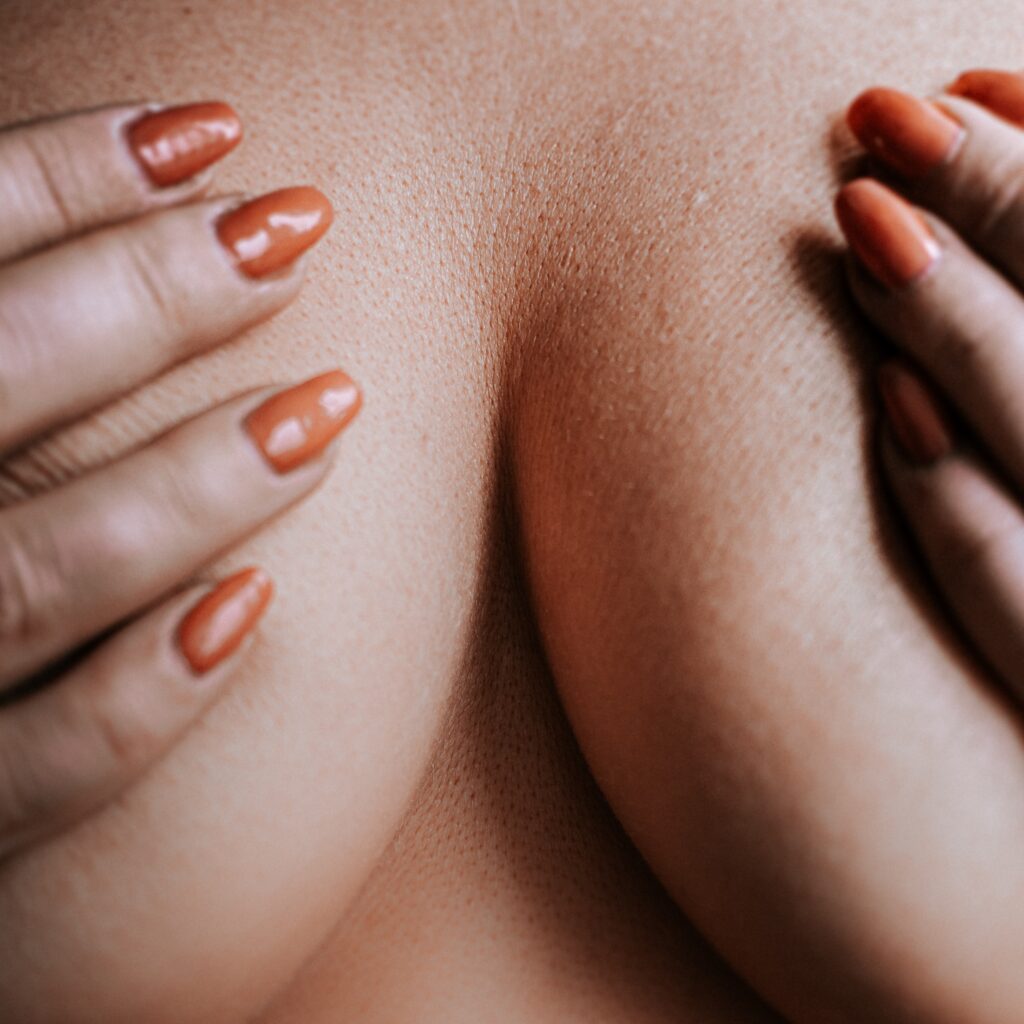
Tiny Miss Mini Queen
My mother had me when she was 22 years old. I was five pounds, nine ounces, and had chunky arms and legs that extended 18 inches long. I was a chubby little darling with golden ringlet curls like Shirley Temple and thick thighs like Demi Lovato. I was always dressed in elastic leggings because most other fabrics wouldn’t set over my tender curves, but I was too young to care. I miss not caring.
As my body developed, I began to partake in modeling pageants and spent a great deal of time posing for headshots and delightful photo ops. I swaggered around in embellished denim jackets, Velcro high-top sneakers, and tulle gowns with puffed-up shoulder ruffles that nearly touched my ears. I modeled for about three years and won a collection of trophies and sashes—Gold Coast Charmer, Tiny Miss Mini Queen, Best Hair, and Best Smile. They should have created a crown for Most Likely to Develop an Eating Disorder. I would have had it in the bag.
At five years old, I didn’t have an understanding of body image or self-esteem. I didn’t know what the standards of an “ideal” body was or what kinds of bodies would earn more favor and attention. I had no knowledge of diet culture and the toxic messaging I would be exposed to. I was naive to the fact that you would make yourself known and disrupt every area of my life. I walked carelessly down the pageant stage in my itty-bitty bathing suit, embraced my non-existent thigh gap, and pranced around with my bucket and shovel like I was fucking Beyoncé.
Food wasn’t always the enemy. As a child, I willingly ate from each of the five food groups and relished in dessert guilt free. I had an incredibly fortunate upbringing and I grew up with a lot of privilege, as most upper middle class families do. We never dealt with financial challenges, oppression, or food scarcity, and this is important to share because these elements serve as a seedbed for many individuals who develop eating disorders. My mother whipped up pure magic in the kitchen and family dinner was essential in our household.
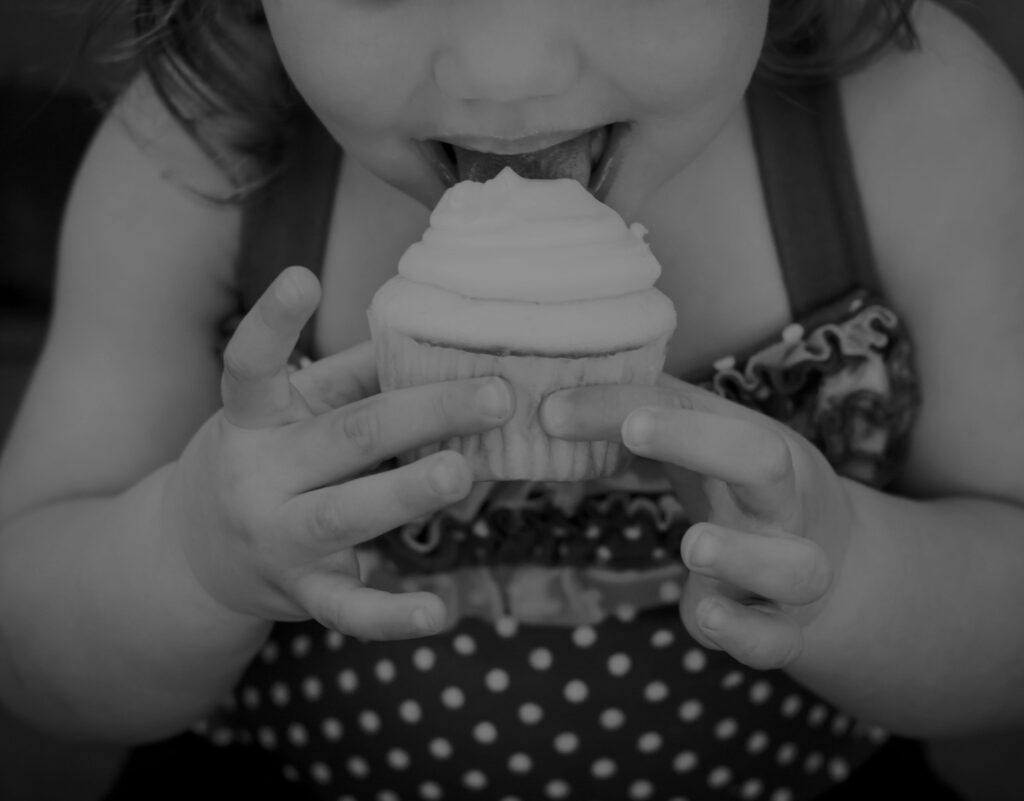
You
As I matured into a teenager in high school, the unconcerned attitude began to diminish when I really started to observe the bodies of the other women around me. I was never overweight, but my proportions were different and I was always a bit fuller than the other girls. I had an hourglass shape before Kim Kardashian made it the most sought-after figure in the world and waist trainers became a necessity. I became especially self-conscious about my body when my close friends nicknamed me “Kimberbutt”. To them it was endearing, but to me it was humiliating. The fixation over my curves gradually escalated and I thought I could alleviate the focus on my flesh by changing another part of me—my hair. The smell of fumes in the garage from boxed hair dye is not to be forgotten. I sat quietly as my mother innocently painted my curls from brown to intense auburn.
By the time I was mid-way through college, my habits around shifting my exterior became more frequent. I didn’t know who I was. I had a hard time making friends, and I felt alone. That’s when you interrupted my life and started to meddle with my inner voice. You waited until I was at my lowest and made your move like a bully. I found myself incessantly changing my hair and the clothes in my wardrobe—overspending and over dying—to make myself feel more confident about my appearance. I thought this would make me happier, that I would emerge from my introverted ways because I was more attractive. But instead, I isolated in pity and flirted with starvation.
I was caught in a continual mental battle—attempting to disregard your hurtful whispers in my head—are you sure you want to eat that? Do not eat that. That muffin is going to make you fat. You are disgusting. The dialogue was so cruel. I began depriving my body of food and existed on juice and broth, cocaine and diet pills. I exercised twice a day because you encouraged me to live a healthier lifestyle. We fasted together—one week to 30 days—and we drank more greens. We cut out certain food groups and defined food rules like a secret girl’s club. I thought I was leading the way, but it was you. It was always you. I never fully grasped how out of control I really was until the day I couldn’t stop.
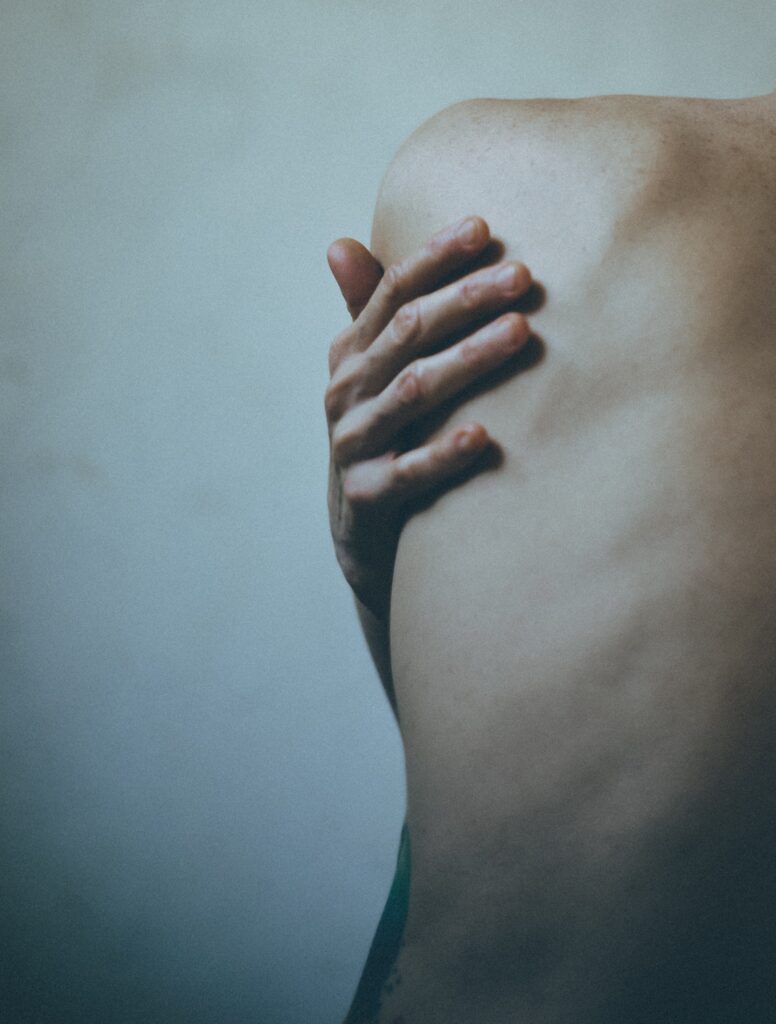
The Forum
Eventually, you led me to a bulimia-positive forum where I stumbled upon a beginners guide to self-induced vomiting. The pages of anorexic women and selfies of girls proudly revealing the bones of their rib cages are still embedded in my mind. I was stunned by the images and felt discomfort in my gut. I tried to look away, but your voice grew louder and I continued to explore. I read their tips for eating disorder novices, like crumbling food into a napkin under the dinner table and shoving a paper towel towards the back of your throat to trigger a gag reflex. Approximately 4.7 million females and 1.5 million males experience bulimia in their lifetimes, and most of them suffer in silence. I suffered in silence.
The first time I made myself throw up was during a family gathering. You told me that it was okay to give in this time, to eat as much as I wanted because now I had a way out. I could remove the calories from my body and remain empty. I could even indulge in the large tray of baklava as long as I ate it in the bathroom where no one can witness my gluttony. It sounded so easy. But you tricked me. Nothing in life is that easy and every action has a consequence. I cleared my dinner plate and went in for seconds—spinach pies, tender chicken and onions smothered in sumac, rice pilaf garnished with parsley and toasted pine nuts. The flavors of “bad” foods lingered on my tongue like a drug and I wanted to taste them forever. I continued to eat beyond the feeling of fullness. It was as if I was possessed, but I was genuinely hungry. I could feel my belly extending, but I proceeded to wrap two pieces of the syrupy dessert into a paper towel, placed them in my purse, and made my way to the upstairs bathroom.
I sat on the cold marble tiles and consumed the layered pastries in solitude until the guilt set in. The feeling of heaviness in my body was miserable and I became nauseated. I was angry with myself for bingeing on off-limit foods. I was ashamed for filling up the plate a second time. You told me it would be okay, that it would all be over soon. I trusted you, but I should have known better.
I took a breath and positioned myself on my knees in front of the toilet. At first, I used two fingers and pushed them against the back of my tongue, but nothing happened. I tried for a second time, but my eyes only watered and I found myself dry heaving like a dog choking on his own fur. Then I tried using a toothbrush I found below the sink, but I was still unable to bring up the food from my belly. I glanced down at the sticky paper towel and decided to attempt the trick I read about on the forum. I rolled it up into a ball and pushed it towards the back of my mouth. I could feel my diaphragm and abdominal muscles contracting simultaneously until the pressure in my stomach forced the food up my esophagus. Mascara traveled down my blushed cheeks as I purged. We watched the calories and empty carbs merge with the soggy fibers being flushed down the throne, but remnants of shame lingered at the surface. I felt a sense of freedom that night and bulimia became an erratic practice in my life for nearly ten years.
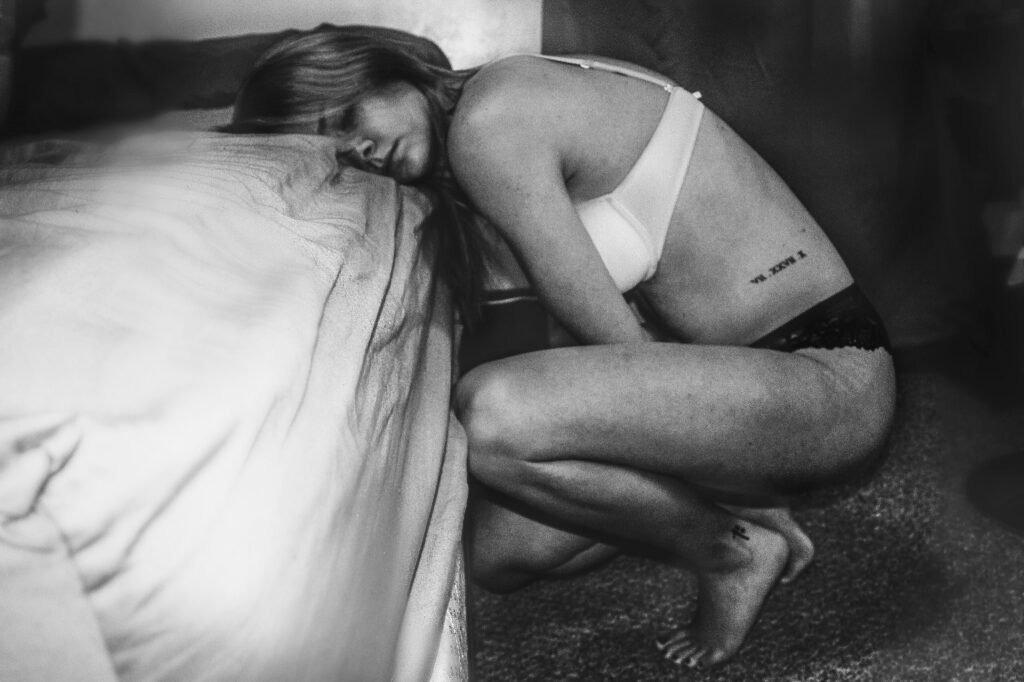
Reclaiming My Body
Disordered eating has always existed in phases, but body dysmorphia is a constant enigma. Recovery has not been an easy task and most of the time, it feels as though I am half-sick and half in control. Sometimes I can still feel you nagging in my back pocket when I eat a cookie, but I am learning how to tune out your voice and hear my own because I know I have the capacity to guide and trust myself. I know I am capable of dealing with any obstacles that come my way with ease.
While rebuilding a balanced relationship with food is an ongoing process, I am on a continuous path toward healing and discovering new love for myself and for the body that I am in. I recognize that I am in partial recovery. I am aware that I still think about food fairly often. I still meticulously plan my meals. I still scroll endlessly through potential Postmates options I rarely actually order and save those low-carb sugar-free dessert recipes on Pinterest. My mind is still often spellbound by the seductive nut butters and pumpkin spiced granola in my pantry. There are moments when I still feel guilty for allowing snacks in my home. I still worry about the kinds of foods that will be served at family functions and I am still immensely triggered when someone tells me I look “healthy”.
I am not afraid to admit that I am a work in progress. A part of recovery is learning and unlearning and I am unraveling years of your harmful patterns and belief systems. But in doing so, I am returning to the heart of my family where food is a form of nourishment and kinship rather than deprivation and seclusion, where the dinner table is a place of prayer and shared gratitude rather than fear and dishonor. I am doing the work. I am no longer refusing to break bread. And I am learning to love myself unconditionally. Thank you for trying to help, but I am going to do something different now because your services are no longer needed. I am taking back my power. I am reclaiming my body as my own.

